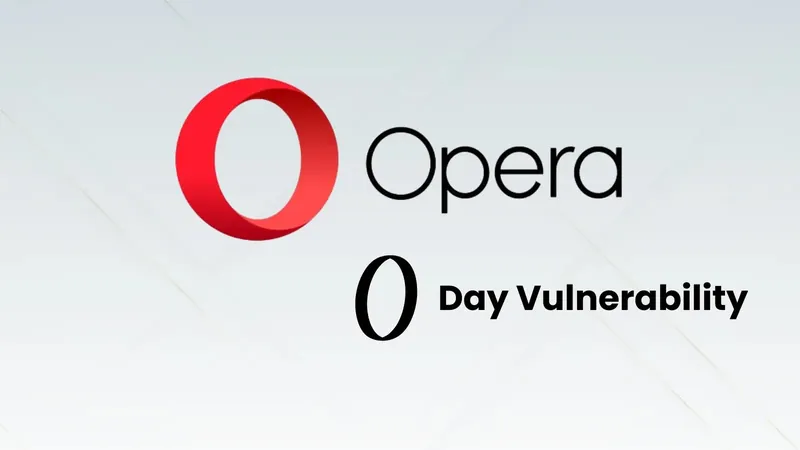
Critical 0-Day Vulnerability in Opera Browser Exposes Users to Malicious Extensions!
2024-11-04
Author: Sarah
Introduction
A newly discovered vulnerability in the Opera web browser has created a significant security risk by allowing malicious extensions to exploit unauthorized access to private APIs, which can lead to alarming scenarios like account hijacking and various security breaches.
Details of the Vulnerability
The flaw, identified by researchers from Guardio Labs and labeled “CrossBarking,” has been patched as of September 24, 2024, following Opera’s commitment to responsible disclosure practices. The root of this weakness lies in the browser’s architecture, where special web applications under specific domains were granted unique privileges essential for supporting features like Opera Flow, Opera Wallet, and Pinboard.
Exploitation of the Flaw
These privileged domains provided access to private APIs embedded directly into Opera’s core code, enabling malicious extensions to inject harmful code that could penetrate the intended security barriers. To demonstrate the potential consequences of this vulnerability, Guardio Labs created a proof-of-concept attack using a seemingly harmless puppy-themed extension uploaded to the Chrome Web Store, highlighting how easy it was for users to unwittingly expose themselves to threats.
Potential Threats
Upon installation, this treacherous extension could execute damaging code on Opera’s vulnerable domains, allowing attackers to capture open tab screenshots, extract session cookies, and even manipulate DNS-over-HTTPS settings, paving the way for man-in-the-middle attacks. The ease with which cybercriminals could exploit this flaw raises alarm bells regarding the effectiveness of security measures surrounding browser extensions.
Past Incidents and Broader Concerns
The situation has become even more concerning given past incidents, such as the earlier discovered “MyFlaw” bug, which enabled arbitrary file execution on users' systems within the Opera browser. Additionally, recent findings revealed that over 300,000 users of Google Chrome and Microsoft Edge were also victimized by malicious extensions that facilitated data exfiltration and unauthorized command execution.
Response from Opera
In response to the CrossBarking vulnerability, Opera has acted swiftly, implementing crucial security patches and revoking third-party domain privileges. The company has assured users that they are in the process of a thorough restructuring of their features to eliminate this security loophole altogether.
Conclusion
As web browsers constantly evolve with new functionalities, achieving the right balance between enhanced user experience and robust security measures remains a daunting task. Users are urged to keep their browsers updated and to exercise caution when installing extensions, regardless of their origin, to protect themselves from potential threats lurking in their browser.
Final Note
Stay safe online, and remember—one innocent click could lead to your accounts being compromised!


 Brasil (PT)
Brasil (PT)
 Canada (EN)
Canada (EN)
 Chile (ES)
Chile (ES)
 España (ES)
España (ES)
 France (FR)
France (FR)
 Hong Kong (EN)
Hong Kong (EN)
 Italia (IT)
Italia (IT)
 日本 (JA)
日本 (JA)
 Magyarország (HU)
Magyarország (HU)
 Norge (NO)
Norge (NO)
 Polska (PL)
Polska (PL)
 Schweiz (DE)
Schweiz (DE)
 Singapore (EN)
Singapore (EN)
 Sverige (SV)
Sverige (SV)
 Suomi (FI)
Suomi (FI)
 Türkiye (TR)
Türkiye (TR)